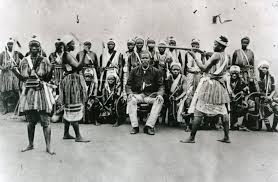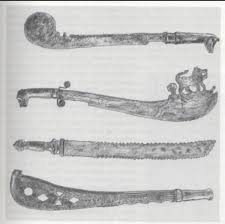Introduction
When you think of warriors, you might picture male soldiers clad in armor, but what about an elite, all-female military regiment? The Dahomey Amazons were an extraordinary group of women who defied gender norms and became a formidable force in West Africa. Hailing from the Kingdom of Dahomey (modern-day Benin), these warriors left an indelible mark on history. Yet, their story remains largely untold. Let’s uncover the fascinating history of the Dahomey Amazons, their rise to power, and their lasting legacy.
Who Were the Dahomey Amazons?

The Dahomey Amazons, known locally as Agojie, were an all-female military regiment of the Dahomey Kingdom. They were renowned for their discipline, fearlessness, and skill in combat.
The Origins of the Agojie
The origins of the Dahomey Amazons date back to the 17th century. Initially, they served as royal bodyguards for the king, but over time, their role expanded into a full-fledged military force.
The Kingdom of Dahomey
The Kingdom of Dahomey, established in the early 1600s, was one of West Africa’s most powerful states. Its success was built on military strength, strategic alliances, and trade.
Dahomey’s Rise to Power
Under leaders like King Ghezo (1818–1858), Dahomey rose to prominence. The Agojie became central to its military strategy, solidifying the kingdom’s dominance in the region.
A Kingdom of Trade
Dahomey was a major hub in the transatlantic slave trade, which also shaped the role of the Agojie. These women were often involved in raiding missions to capture slaves for trade.
Training and Discipline of the Amazons
Becoming an Agojie was no easy feat. These women underwent rigorous training that transformed them into elite warriors.
Also Read: What Happened to Today’s Youths? Who Are to Blame?
The Recruitment Process
Many Agojie were recruited from a young age, often as orphans or captives. Others volunteered, drawn by the promise of honor and protection under the king’s service.
The Rigorous Training Regimen
Training involved mastering hand-to-hand combat, weapons handling, and survival skills. The Agojie were taught to endure pain and suppress fear, making them fearsome in battle.
Weapons and Warfare
The Dahomey Amazons were equipped with weapons that suited their combat style, blending traditional techniques with innovative strategies.
The Armory of the Agojie

The Agojie used muskets, machetes, and spears. Their weaponry was often acquired through trade or captured in battle.
Tactics on the Battlefield
Known for their guerrilla tactics, the Agojie excelled in ambushes and close combat. Their ability to outmaneuver opponents often gave them the upper hand.
The Role of Women in Dahomey Society
The presence of the Agojie reflected Dahomey’s progressive view of gender roles, which allowed women to occupy significant positions of power.
Women Warriors in Leadership
The Agojie were not merely soldiers; they were influential advisors to the king. Some even participated in royal ceremonies and diplomacy.
Breaking Gender Norms
While many societies relegated women to domestic roles, Dahomey empowered them as warriors and leaders, challenging traditional gender dynamics.
The Decline of the Agojie
The decline of the Dahomey Amazons came with the fall of the kingdom itself. However, their impact remains a powerful symbol of resistance and resilience.
European Colonization and Conflict
In the late 19th century, Dahomey faced invasions from the French colonial forces. Despite their bravery, the Agojie were outgunned and outnumbered.
The End of an Era
The Kingdom of Dahomey was annexed by France in 1894, marking the disbandment of the Agojie. Yet, their legend endured, inspiring future generations.
The Legacy of the Dahomey Amazons
The story of the Agojie continues to resonate, serving as a testament to women’s strength and courage.
Cultural Representations
The Dahomey Amazons have inspired countless works of literature, films, and folklore, including recent portrayals in popular media like The Woman King.
A Symbol of Female Empowerment
In modern times, the Agojie symbolize empowerment, resilience, and the breaking of barriers, inspiring women worldwide to challenge societal norms.
Rediscovering the Agojie
For years, the story of the Dahomey Amazons was overshadowed by other historical narratives. Today, efforts are being made to ensure their story is remembered.
Archaeological Discoveries
Archaeological excavations in Benin have uncovered artifacts and historical sites linked to the Agojie, offering deeper insights into their lives.
Celebrating Their Legacy
Cultural initiatives and academic studies are bringing the Agojie’s story to the forefront, ensuring they receive the recognition they deserve.
Why Their Story Matters
The tale of the Dahomey Amazons is not just about history; it’s about rewriting narratives and celebrating diversity in the stories we tell.
Recognizing African History
By exploring the history of the Agojie, we acknowledge Africa’s rich and diverse heritage, often overlooked in global discourse.
Lessons for Modern Times
The Agojie remind us of the power of courage, discipline, and unity in overcoming challenges, values that resonate across time and cultures.
Conclusion
The Dahomey Amazons were not just warriors; they were pioneers who shattered societal expectations and redefined what women could achieve. From their rigorous training to their fearless exploits in battle, the Agojie left an unforgettable mark on history. As we continue to uncover their stories, we celebrate their courage and ensure their legacy inspires generations to come.
FAQs
Q1: Who were the Dahomey Amazons?
The Dahomey Amazons, or Agojie, were an elite all-female military regiment in the Kingdom of Dahomey (modern-day Benin).
Q2: What role did the Amazons play in Dahomey?
They served as the kingdom’s primary military force, engaging in battles, protecting the king, and influencing political decisions.
Q3: How were the Amazons trained?
The Agojie underwent rigorous training in combat, weaponry, and survival, ensuring they became elite warriors capable of enduring extreme conditions.
Q4: What led to the decline of the Dahomey Amazons?
Their decline occurred with the fall of the Dahomey Kingdom, which was annexed by French colonial forces in 1894.
Q5: Why are the Dahomey Amazons significant?
The Amazons symbolize resilience, courage, and the breaking of gender barriers, inspiring movements for female empowerment worldwide.


